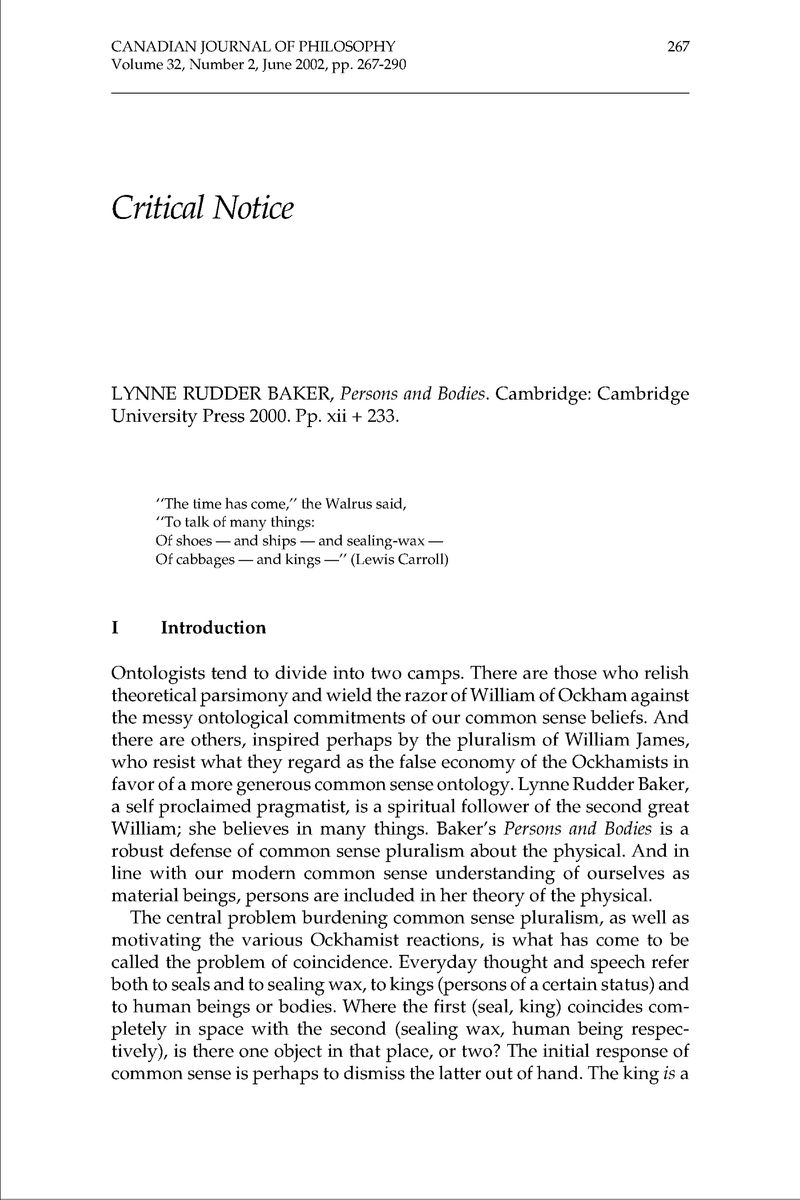No CrossRef data available.
Article contents
Lynne Rudder Baker Persons and Bodies. Cambridge: Cambridge University Press 2000. Pp. xii + 233.
Review products
Published online by Cambridge University Press: 01 January 2020
Abstract

- Type
- Critical Notice
- Information
- Copyright
- Copyright © The Authors 2002
References
1 David Wiggins, Sameness and Substance (Cambridge, MA: Harvard University Press 1980); also Identity and Spatio-temporal Continuity (Oxford: Blackwell 1967). Baker herself defends the two-object (non-identity) solution against relative- (or contingent-) identity theory in ‘Why Constitution Is Not Identity,’ Journal of Philosophy 94 (1997) 599-621.
2 Frederich Doepke, ‘Spatially Coinciding Objects,’ in Michael Rea, Material Constitution (Lanham, NJ: Rowman & Littlefield 1997), 10-24. Peter van Inwagen, Material Beings (Ithaca: Cornell University Press 1990). (See 124ff for van Inwagen's objections to the coincidence theory.) To see how a compositional, or part/whole, theory of a type closer to common sense than van Inwagen's can be infected by the coincidence difficulty, see David Wiggins, ‘On Being in the Same Place at the Same Time,’ in Rea, 3-9.
3 Baker's own attempt at making sense of this is to invoke context dependent practices of counting: ‘We may count either by identity… or by nonseparateness,’ she writes (174-5). But to be told that two inseparable objects might sometimes be counted as one is hardly to deny that they are two!
4 Baker, 57; Michael Burke, ‘Copper Statues and Pieces of Copper,’ Analysis 52 (1992) 12-17
5 Mark Heller, The Ontology of Physical Objects (Cambridge: Cambridge University Press 1990), 30-1; Burke, ‘Copper Statues.’
6 David Lewis, The Plurality of Worlds (Oxford: Blackwell 1986), 248ff
7 The paradox of the doubling of quantitative properties was suggested by Lewis, 253. A more general statement of the properties objection, as directed against a constitutionalist reading of Locke, is found in Gary Wedeking, ‘Locke on Personal Identity and the Trinity Controversy of the 1690s,’ Dialogue 29 (1990), 180-1.
8 This is because the key requirement [I(b)(2)(ii)] for a constituted object, y, to possess a property H nonderivatively is that there could be no object x which constitutes y such that x bears H nonderivatively.
9 A second exception is that of strands of DNA constituting a gene (21, 35). This example appears to do duty for many other cases of constitution in nature. Unfortunately it receives virtually no discussion or analysis. One standard way of construing the difference is to think of ‘gene’ functionally, as specifying a certain causal role, while DNA is that which in fact plays that role. But the causal role itself is abstract, certainly not a material object. The physical thing involved is the thing that plays this role. And that thing is in fact identical to the DNA. So there is no room here for a (non-identity) relation of constitution.
10 Gareth Evans, ‘Can There Be Vague Objects?’ Analysis 38 (1979), 208
11 See Appendix.
12 Baker seems to associate the first element with the perspectivalism of animal mentality. At least that is what I am inclined to infer from her citation of Perry (but not Casteneda) as offering an account of ‘(merely) perspectival phenomena’ (62, n.6).
13 Peter Unger, Identity, Consciousness and Value (Oxford: Oxford University Press 1990)
14 For textual evidence pointing both ways, see Nicholas Griffen, Relative Identity (London: Oxford University Press 1977), 17-19, and Michael Ayers, ‘Individuals without Sortals,’ Canadian Journal of Philosophy 4 (1974), 125, n.19. See also William Alston and Jonathan Bennett, ‘Locke on People and Substances,’ Philosophical Review 93 (1988), 27-8, and Wedeking, ‘Locke on Personal Identity,’ 179f.
15 See Gary Wedeking, ‘Locke's Metaphysics of Personal Identity,’ History of Philosophy Quarterly 4 (1987) 17-31.
16 See (8-10) for Baker's own reading of Locke. Baker distinguishes her view from Locke's in that ‘According to Locke, persons … are not basic substances’ (9). The expression ‘basic substance,’ however, is not to be found in Locke. And in the sense defined by Baker, as applying ‘to those things that must be included in a complete inventory of the world,’ Locke undoubtedly did hold persons to be basic substa
17 I would like to thank two referees from this journal as well as D.G. Brown, James Kelleher, Seth Makinson and especially Melinda Hogan for helpful comments on earlier drafts of this essay.


